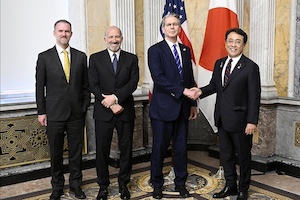U.S.-Japan Tariff Negotiations Reach Impasse as Japan’s Request for Exemption Is Rejected

The Trump administration in the United States has announced a 10% reciprocal tariff on all imported goods, with an additional 14% imposed specifically on Japanese imports. Despite Japan’s active push for an exemption, the U.S.-Japan tariff negotiations have reached a stalemate, with the U.S. refusing to make any concessions.
According to Japan’s Kyodo News, the second round of cabinet-level tariff negotiations between the U.S. and Japan was held on May 2 at the U.S. Department of the Treasury and lasted two hours. The U.S. was represented by Treasury Secretary Scott Bessent and Trade Representative Jamieson Greer, while Japan was represented by Economic Revitalization Minister Ryosei Akazawa.
After two rounds of talks, the U.S. explicitly rejected Japan’s request to negotiate an exemption from the 10% reciprocal tariff. Tariffs on automobiles and steel were excluded from the negotiations. The U.S. only agreed to negotiate the possibility of postponing the additional 14% tariff until July 9. However, this tariff would not be reduced to zero—only a potential reduction or an extension of the grace period would be considered.
Additionally, on April 2, the Trump administration officially announced its tariff policy, imposing a 10% tariff on all imported goods from all countries and regions. Higher rates were imposed on countries deemed to levy high tariffs on U.S. goods—China at 34%, South Korea at 25%, Japan at 24%, the European Union at 20%, and Taiwan at 32%. The policy took effect at midnight on April 9, Eastern Time. However, Trump later announced a 90-day suspension of full implementation, citing that over 75 countries had sought negotiations and refrained from retaliatory measures. During this period, only the 10% tariff would be applied.
- 127 reads
Human Rights
Fostering a More Humane World: The 28th Eurasian Economic Summi

Conscience, Hope, and Action: Keys to Global Peace and Sustainability

Ringing FOWPAL’s Peace Bell for the World:Nobel Peace Prize Laureates’ Visions and Actions

Protecting the World’s Cultural Diversity for a Sustainable Future

Puppet Show I International Friendship Day 2020

